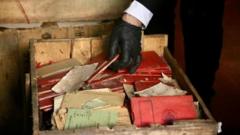In a surprising discovery, wooden crates filled with Nazi-era documents were found in the basement of Argentina's Supreme Court as workers prepared for the transfer of the court's archives to a new museum. The documents, which were sent by the German embassy in Tokyo, arrived in Argentina on June 20, 1941, inside 83 diplomatic pouches aboard a Japanese steamship, named the Nan-a-Maru. Argentine customs officials intercepted five of these pouches and uncovered various Nazi propaganda materials, raising suspicions that sparked further investigation at the time.
Last week, court workers stumbled upon the crates while sorting archival material, unveiling content that included membership booklets and photographs designed to promote Adolf Hitler's ideology within Argentina during World War Two. The court has since secured the documents and reached out to the Buenos Aires Holocaust Museum for assistance in inventorying the materials.
Historians are hopeful that these documents may provide critical insights into the Nazis' financial networks and their international connections. The Supreme Court has confirmed that the cargo had been listed by the German embassy as "personal effects." However, due to the unusual quantity and the contents of the pouches, customs officials raised red flags, which ultimately led to a judge ordering the confiscation of all 83 pouches.
Despite their seizure in 1941, the fate of the crates languished in the court's basement until their recent rediscovery, following a long period of inaction during which Argentina maintained its neutral stance in the war. Following World War II, Argentina became a haven for several prominent Nazis, including war criminal figures such as Adolf Eichmann and Josef Mengele. In a formal acknowledgment of this historical legacy, former President Fernando de la Rúa issued an apology in 2000 for Argentina's role in sheltering these war criminals.


















